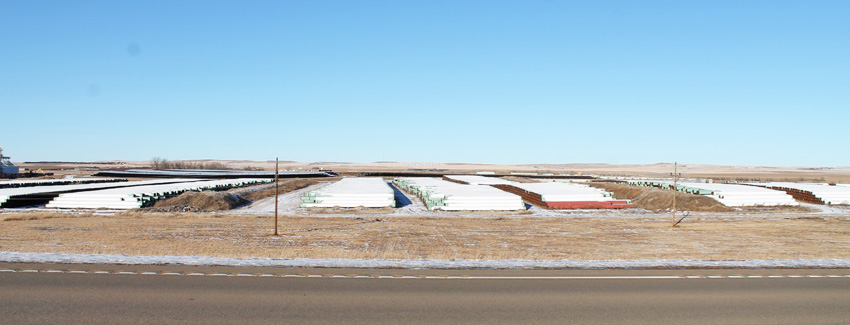TransCanada’s Keystone XL pipeline is not as dead as some of its adversaries claimed after President Obama denied the presidential permit for the border-crossing section of the tar sands pipeline.
The company’s plans for the South Dakota part of the pipeline are still in play after the South Dakota Public Utility Commission (PUC) denied a motion to throw out the company’s request to certify its expired permit.
The motion to dismiss the Keystone XL South Dakota permit renewal was made by a team of lawyers representing indigenous tribes, the grassroots group Dakota Rural Action, and individual landowners referred to as Intervenors.
The Intervenors argued that TransCanada didn’t meet conditions that the original permit called for. Not only should TransCanada not be able to get recertification of the expired permit, they said, but the permit should be revoked in its entirety.
The lawyers cited a condition in the PUC’s 2010 permit: “Keystone shall obtain and shall thereafter comply with all applicable federal, state and local permits, including but not limited to: Presidential Permit from the United States Department of State.”
They argued that, with the denial of the presidential permit, TransCanada couldn’t comply with all applicable laws and rules.
TransCanada countered in its pre-filed motion, “Nothing prevents Keystone from filing another application and yet obtaining a Presidential Permit.”
The company’s lawyers reiterated that TransCanada is still committed to building the pipeline, so the certification process should be completed.
One of TransCanada’s attorneys argued against the president’s conclusion that the pipeline is not in the United States’ national interest. He brought up Iran, and how that country could close down the Straits of Homuz.
Garry Dorr, an Intervenor and member of the Nez Perce Tribe, objected to letting the lawyer continue on the grounds the testimony was outside of the scope under consideration. The PUC agreed, making it impossible for TransCanada to get on the record the unsubstantiated claim that the Keystone XL would benefit U.S. national security.
After the hearing, DeSmog collected reactions from some of the Intervenors. “We were obviously disappointed,” Robin Martinez, one of the Intervenors’ lawyers wrote in an email. “For us, it was a very clear argument. The conditions of the original permit obtained by TransCanada in 2010 unequivocally stated that the company had to obtain a Presidential Permit. TransCanada failed to do so.”
The Intervenors pointed out that there are good reasons that permits have expiration dates. Conditions can change over time, and those changes can impact a project, which is why expired permits must be recertified.
“In its ruling today, the Commission, in effect, has taken the position that any applicant for a permit simply has to state that if, at some point in the future they might comply with the law, that’s good enough to keep a permit perpetually in play,” Martinez explained.
“Perhaps what’s most discouraging is the effect the Commission’s ruling has on South Dakota’s farming and ranching families who are in the path of the proposed pipeline. By keeping TransCanada’s permit perpetually alive, they have been denied the finality they deserve. That’s not a just outcome.”
Another motion ruled on today was the Intervenors’ request that the PUC add into evidence the information gathered at the evidentiary hearing that took place this summer: a notice of probable violation sent by federal pipeline regulators to TransCanada. That motion was passed.
The notice the Pipeline and Hazardous Materials Safety Administration (PHMSA) sent to TransCanada on November 20th revealed that the regulators are planning to fine TransCanada $184,000 for code violations.
The notice backs up the Intervenors’ argument made to the commission this summer: that it should deny TransCanada certification because the company has proved to be unable to follow the rules. The letter alleges that TransCanada failed to follow existing PHMSA safety regulations for construction designs and inspection procedures.
The most troubling finding was the failure of the pipeline’s cathodic protection, which led to the pipeline’s wall corroding 96.8% in one area. By the time the incident was reported to regulators, the pipeline was dangerously close to rupturing. And the proximity of the corrosion incident to the Missouri River and St. Louis could have resulted in contamination of the water source for millions of people.
“Compliance with PHMSA regulations is required by the PUC’s construction permit,” Bruce Ellison, another attorney for the Intervenors’, pointed out.
The Intervenors have already gotten some of TransCanada’s documented history of non-compliance entered into evidence, but not everything they wanted to enter into evidence was accepted by the Commission. This letter offers additional proof of the company’s inability to follow the rules.
“The conditions are designed to ensure pipeline safety and if they are not followed, safety cannot be assured,” Ellison wrote.
TransCanada requested that if the commission adds into evidence PHMSA’s letter it also add the company’s rebuttal letter. The company pointed out that the PHSMA findings are not final, and claimed the letter is not relevant because TransCanada has addressed all of the regulators’ concerns. The request was denied and won’t be considered by the commission while it makes its decision.
The commission’s ruling on the permit was expected in October, but was postponed but was expected before the end of this year. However,
after the last motions were heard, the PUC announced it will make its decision on Keystone XL on Jan. 5, 2016.
“We will soon learn whose interests the PUC really protects,” Ellison said.
“Despite common sense, adherence to their own administrative rules, and case law, the commission has been unwavering in their steadfast support of the KXL,“ Dorr told DeSmog. “Even if they somehow manage to stomach approving the KXL permit in the state of South Dakota, their reasoning defies all jurisprudence. But we’re not done yet.”
If the permit is certified, the Intervenors say they will appeal.
Image credit: TransCanada’s pipe yard near Gascoyne, North Dakota, where the material to build the Keystone XL pipeline remains. © 2015 Bret Clanton
Blog Image credit: TransCanada’s pipe yard near Gascoyne, North Dakota. © 2013 Cindy Meyers.
Subscribe to our newsletter
Stay up to date with DeSmog news and alerts







